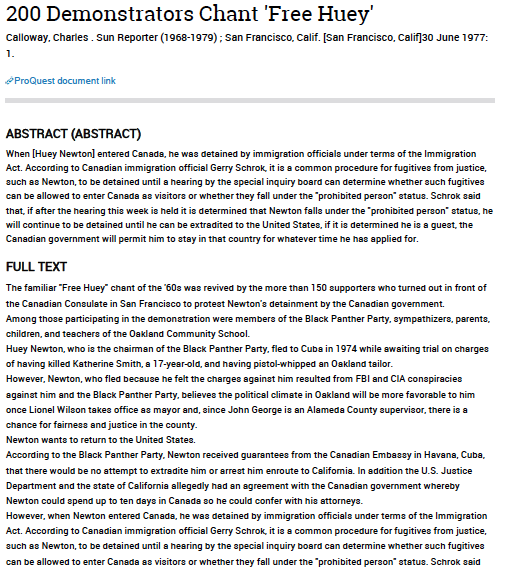Huey Newton’s return from Cuba was an important moment for the Oakland Community School. This article describes how 150 people protested Newton’s detainment by Canadian government in front of the Canadian consulate in San Francisco in 1977. Among these protesters were parents, teachers and students of OCS.
Newton had fled to Cuba after charges of killing a 17 year old girl and pistol whipping an Oakland tailor. However, he felt that charges were due to FBI and CIA conspiracies against him, and that the political climate in Oakland would be more favorable to him than it had been when he left. This shift, he said, was due to the election of Lionel Wilson, the first Black mayor of Oakland; and John George, the first African American elected to the Alameda County Board of Supervisors. Because of these two politicians, the article stated that “there is a chance for fairness and justice in the county.” This statement indicates a distrust for white politicians due to the history of injustice done to Black community.
Though Newton had an agreement with the Canadian embassy that they would not arrest him enroute to the U.S, and the U.S. Justice Department and the state of California agreed that he would have 10 days in Canada to confer with his lawyers, he was detained by immigration officials under terms of the Immigration Act upon his arrival in Canada. According to Elaine Brown, a Party leader, the Canadian government had “Breached the good faith that the party and Newton have kept with it […] the Canadian Consulate has been very nasty and vague to me and other members of the party regarding all of our attempts to find out any information regarding the detainment of Huey Newton.” This perceived breach of good faith sparked the protest.
Unfortunately, this archive only includes the text of the article, but the caption of the original photo is still useful. The photo is captioned: “Five-year-old Irene Mattson, who is in Group Level 4 at the Oakland Community School, was one of the participants in the demonstration in front of the Canadian Consulate in San Francisco.” This caption indicates that from a young age, at least some Oakland Community School students were involved in events and protests regarding the Black Panther Party.
Newton’s return marked a turning point for the school: Ericka Huggins discusses in her oral history how Newton’s drug addiction, driven by COINTELPRO, negatively impacted the culture and finances of the school. More generally, this article helps show the profound connections between the Oakland Community School, the Black Panther Party, and the United States government.
